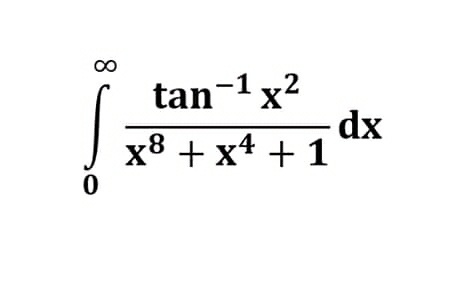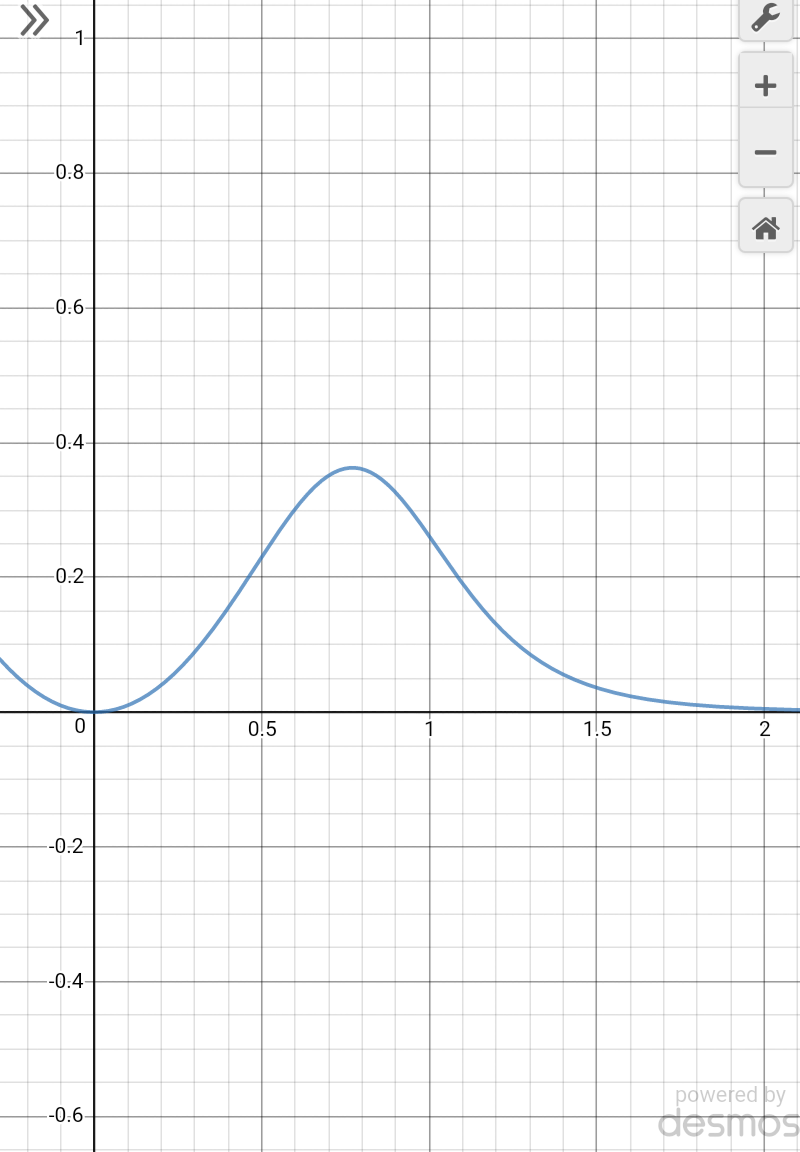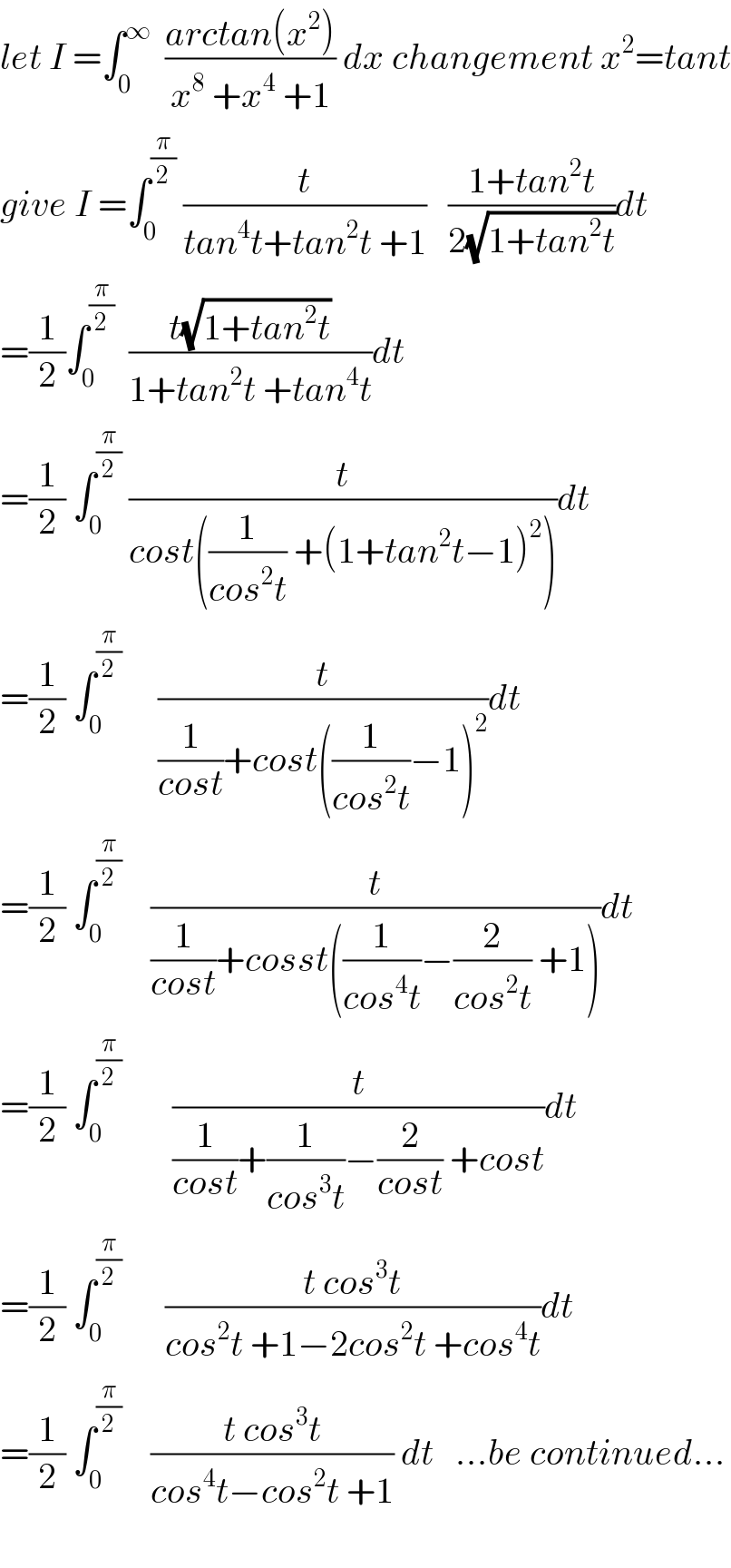
Question and Answers Forum
Question Number 52356 by Tawa1 last updated on 06/Jan/19

Commented by tanmay.chaudhury50@gmail.com last updated on 06/Jan/19

Commented by Tawa1 last updated on 07/Jan/19

Commented by MJS last updated on 07/Jan/19
![this can′t be solved using elementary calculus not sure if these help: tan^(−1) θ =(i/2)(ln (1−iθ) −ln (1+iθ)) ⇒ ⇒ tan^(−1) x^2 =(i/2)(ln (1−ix^2 ) −ln (1+ix^2 )) ⇒ ⇒ tan^(−1) x^2 =(i/2)ln ((1−ix^2 )/(1+ix^2 )) =(i/2)ln ((1−x^4 +2ix^2 )/(x^4 +1)) = [ln (a+bi) =(1/2)ln (a^2 +b^2 ) +i(sign(b)(π/2)−tan^(−1) (a/b))] =(π/4)+(1/2)tan^(−1) ((x^4 −1)/(2x^2 )) x^8 +x^4 +1=(x^4 +x^2 +1)(x^4 −x^2 +1)= =(x^2 +x+1)(x^2 −x+1)(x^2 +(√3)x+1)(x^2 −(√3)x+1 =(x+((1+i(√3))/2))(x−((1+i(√3))/2))(x+((1−i(√3))/2))(x−((1−i(√3))/2))(x+(((√3)+i)/2))(x−(((√3)+i)/2))(x+(((√3)−i)/2))(x−(((√3)−i)/2))](Q52400.png)
Commented by Tawa1 last updated on 07/Jan/19

Commented by Abdo msup. last updated on 07/Jan/19

Commented by Abdo msup. last updated on 07/Jan/19
![let F(α)=∫_0 ^∞ ((arctan(αx^2 ))/(1+x^4 +x^8 )) dx with α>0 we have F^′ (α) =∫_0 ^∞ (x^2 /((1+α^2 x^4 )(x^8 +x^4 +1)))dx ⇒2F^′ (α) =∫_(−∞) ^(+∞) (x^2 /((x^8 +x^4 +1)(α^2 x^4 +1)))dx let consider the complex function ϕ(z)=(z^2 /((z^8 +z^4 +1)(α^2 z^4 +1))) poles of ϕ? z^8 +z^4 +1=0 ⇔1+z^4 +(z^4 )^2 =0 ⇔((1−z^(12) )/(1−z^4 )) =0 ⇔ z^(12) =1 and z^4 ≠ 1 the roots of z^(12) =1 are z_k =e^(i((kπ)/6)) and k∈[[0,11]] but only we must take 8 roots let search.. z_0 =1 (to eliminate) z_1 =e^((iπ)/6) and z_1 ^4 ≠1 z_2 =e^((iπ)/3) and z_2 ^4 ≠1 z_3 =e^((iπ)/2) and z_3 ^4 =1 (to eliminate) z_4 =e^(i((2π)/3)) and z_4 ^4 ≠1 z_5 =e^((i5π)/6) and z_5 ^4 ≠1 z_6 =e^(iπ) and z_6 ^4 =1 (to eliminate) z_7 =e^((i7.π)/6) and z_7 ^4 ≠1 z_8 = e^((i4π)/3) and z_8 ^4 ≠1 z_9 = e^((i3π)/2) and z_9 ^4 =1 (to eliminate) z_(10) =e^((i5π)/3) and z_(10) ^4 ≠1 z_(11) =e^((i11π)/6) ⇒ z^8 +z^4 +1 =(z−z_1 )(z−z_2 )(z−z_4 )(z−z_5 )(z−z_7 )(z−z_8 )(z−z_(10) )(z−z_(11) ) also we have α^2 z^4 +1 =α^2 (z^4 +(1/α^2 )) =α^2 (z^4 −((i/α))^2 )=α^2 (z^2 −(i/α))(z^2 +(i/α)) =α^2 (z−(1/(√α)) e^((iπ)/4) )(z+(1/(√α)) e^((iπ)/4) )(z−(1/(√α)) e^(−((iπ)/4)) )(z+(1/(√α))e^(−((iπ)/4)) ) so the poles of ϕ are +^− (1/(√α)) e^((iπ)/4) and +^− (1/(√α)) e^(−((iπ)/4)) also tbe complex z_k with k ∈{1,2,4,5,7,8,10,11} after we use Residus theorem ∫_(−∞) ^(+∞) ϕ(z)dz =2iπ Σ_(im(z_k )>0) Res(ϕ ,z_k ) ...be continued ...](Q52417.png)
Commented by Tawa1 last updated on 07/Jan/19

Commented by Abdo msup. last updated on 07/Jan/19

Answered by MJS last updated on 07/Jan/19

